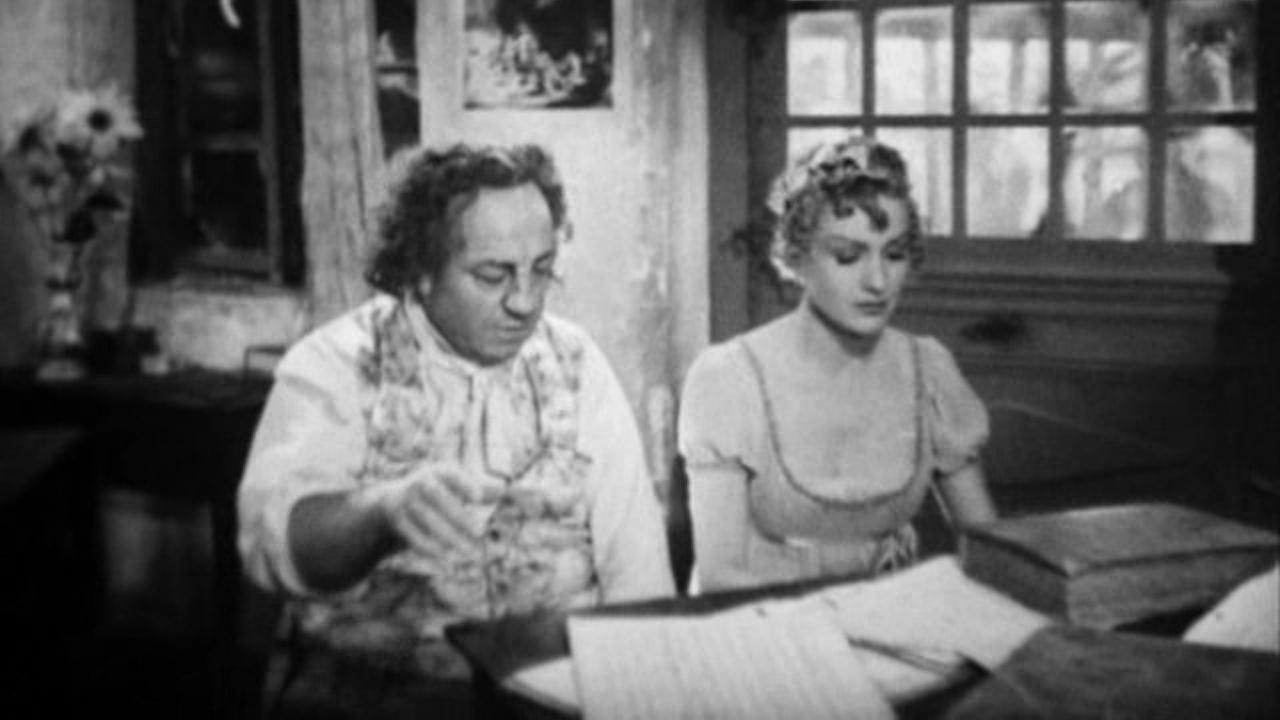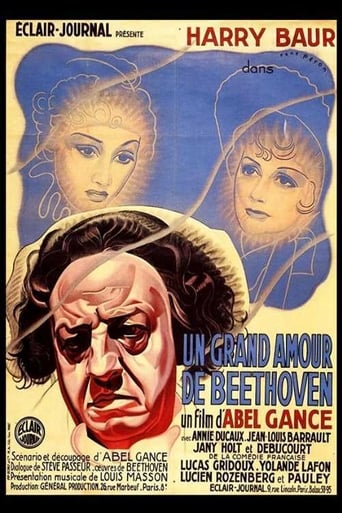

A disaster of a film. Everything is wrong. Nothing works, except the costumes, the one thing in the film which deserves admiration. Beethoven himself is totally unconvincing as a big fat lurch, while in reality he was small and inconspicuous. The intentions of the film are honest and good enough but fail miserably. The invented story is illustrated by the master's music, but the constant repetition of the first bars of the fifth symphony to point out the call of Beethoven's destiny becomes annoying for its debility. The film consists of exaggerations which spoil any possibility of any dramaturgy or realism. The final death scene is unbearably painful, since he never seems to die. The women cry incessantly all through the film turning it into a sentimental mess. They deserve better credit though than Harry Baur as Beethoven for at least being pretty and nice to look at. This is one of the most awkward films I have seen, perhaps though biased by the deeply convincing impression made by the outstanding Beethoven film with Gary Oldman 1994, a completely different version of "The Immortal Beloved" and also a total fake, but so much better and even realistically convincing. This effort to enthrone Beethoven as some kind of divine icon ("I believe in God and in Beethoven." - Richard Wagner, the motto of the film) is a total bathos of a turkey, and the intended apotheosis is only growing constantly more pathetic all the way. There are some sparkling moments, though, where Abel Gance's genius in spite of all succeeds in shining through, in fact, all the actors except Beethoven are quite good, especially the young Jean-Louis Barrault as the dashing nephew, but even in that case the film fails in making something out of the Beethoven drama. In reality, his nephew Karl tried to commit suicide, which was Beethoven's final spiritual death blow. It is not even hinted at here, and yet the film pretends to tell the story of Beethoven. It IS the story of Beethoven, but Beethoven himself is missing, and there is nothing in it but Abel Gance's absurdly vain pretensions. Sorry, any Beethoven film is better than this one.
... View MoreIt's considered polite to write that the silent era was Gance's time and that his talkies were mediocre stuff.Do you need FF Coppola to give them a chance?Do you? Gance was a pioneer even when he made talkies.Actually his post-silent career was a constant drift back and forth between adventure ("La Fin du Monde" "J'accuse" (2nd version),"La Venus Aveugle" "Le Capitaine Fracasse" "Cyrano et D'Artagnan" ) and retreat ("le Roman d'un Jeune Homme Pauvre" "Le Maitre de Forges" -actually mostly directed by Fernand Rivers- "Austerlitz" )."Un Grand Amour de Beethoven" is the follow-up to another historical biopic ("Lucrece Borgia" ) which exposed the worst of the man's weaknesses -or is it because of a bad editing where scenes were lost or deleted?-Gance did not repeat the same mistake:I'm not a specialist,so I will not argue over historical accuracy."Un Grand Amour de Beethoven" is not a biopic ,it's an experimental movie ,which predates another one,Forman's "Amadeus" .Gance's film is a musical poem ,where he tries to enhance the music with his pictures (and not the other way about).Most of the time,he brilliantly succeeds:he virtually invented the "subjective " soundtrack .These scenes when the musician feels the first effects of the illness are among the very best in the French cinema of the thirties,and as the thirties French cinema was the best French cinema ever,it speaks volumes about them.Gance simply cuts loose all the visual effects (mill,nature,thunder)at his command and lets the music surge and flow and ooze around his audience .This is shockingly transcendent stuff ,absolutely intoxicating in its use of dynamics -perhaps inspired by his previous experiments in "La Roue" -from silence to thunder .Gance also finds marvelous scenes to let us hear "moonlight sonata" .Harry Baur gives another sublime performance ;the very long scene depicting the death of the artist has the strength of a dirge : while a "Miserere " is heard ,the face very slowly turns into a death mask.
... View MoreThere are not many filmed biographies dedicated to the Music master of all times, the latest being "Beethoven in Love" (which is Hollywoodiana at its worst).In Abel Gance's version, "Un Grand Amour de Beethoven", not only do we find some of the best French actors of an Era long gone, but we have a true effort at character study.Like in the Austrian movie, which nowadays is practically unavailable, called "Eroica", another excellent example of a screen translation of the man's life, "Un Grand Amour..." is a fair attempt at giving us Beethoven, the man, not the lover, not just the composer, but a man in his time.In this one, somebody may still ask himself if Beethoven's love went to women, to a particular woman, or to a simple and probably more logic choice, to his music. But there is more. The man's interior struggles are shown.In a time period in which Revolutionary thinking seemed to permeate society, Beethoven comes through as the German "revolutionary" composer he was.Beethoven craved for human love like any other human being, but in the end, as the realist he was, and viewed the handicap he was facing, deafness, he concentrated totally and exclusively to his music.In this movie, one can see that struggle for love, but instead of being a defeat to Beethoven (as in the above mentioned trashy movie), the man turns it into a triumph over the senses and brings himself, as well as his own music to an apotheosis never since equaled by any other composer. Abel Gance seems to have understood this and respecting the genius of another master of the artistic trade, delivers a very touching account of the master's life.The only downside to this effort is the poor technology filmmakers had in those days. At times the sound is dreadful and some conversations can only be understood by reading the subtitles (mind you, I speak French fluently, but I still could not understand some passages).The music is hauntingly beautiful, but lacks depth and roundness. Poor Abel Gance, he must have struggled hard to finance this project. Despite these flaws, this is, together with "Eroica" (if one can find it), the only true effort made, at bringing the great master back to life.Being a theatrical director and an actor myself, I am still hoping to be able to, one day, put together some music historians, a dignified cast and crew and start what I always wanted in my childhood: film the entire life of Ludwig van Beethoven, according to his own letter exchange and the biographies of his closest friends and admirers.Beethoven needs and deserves a faithful reconstruction of his life, told to generations to come. He was more than just a musical genius. He was a highly controversial historical, philosophical and revolutionary/reactionary figure.Abel Gance's effort is just a tiny cut in Beethoven's life and by reducing it into a two hour effort, he just partially managed to expose the man behind the composer, turning it naturally, as one would expect from a master such as he was and still is, into a masterpiece.And yet, it is still lacking amplitude. Nevertheless, this movie is a must for every Beethoven fan, if not of master Abel Gance.Let's hope to find soon a larger and better product than "Bethoveen in love".
... View MoreFrom the opening heart-wrenching scene that establishes the marriage of Beethoven's compassion with his extraordinary genius, to the transcendent death scene, The Great Love of Beethoven shows how adept Abel Gance could still be after the grandiosity and gimmickry of Napoleon. This film seems to owe much to the Surrealists, to Renoir, and to the Rembrandt biopic starring Charles Laughton, which I believe was a year or 2 before. The romantic nature of the man and how it both conflicted with and intensified his creative genius is at the center of the film, exploring his relationships in the most effective way: through the use of his timeless music. Of course Ludwig's gradual and intermittent deafness is a critical element of any such biography, and is conveyed by Gance brilliantly. In few films has such familiar and beloved music been used to capture the emotional content of the various moods and episodes of the artist's life, from the deepest melancholy to the gaiety of birdsong that Beethoven channels spontaneously to the delight of the children gathered around and the artist himself. Beautiful, sad, honest & important film...
... View More